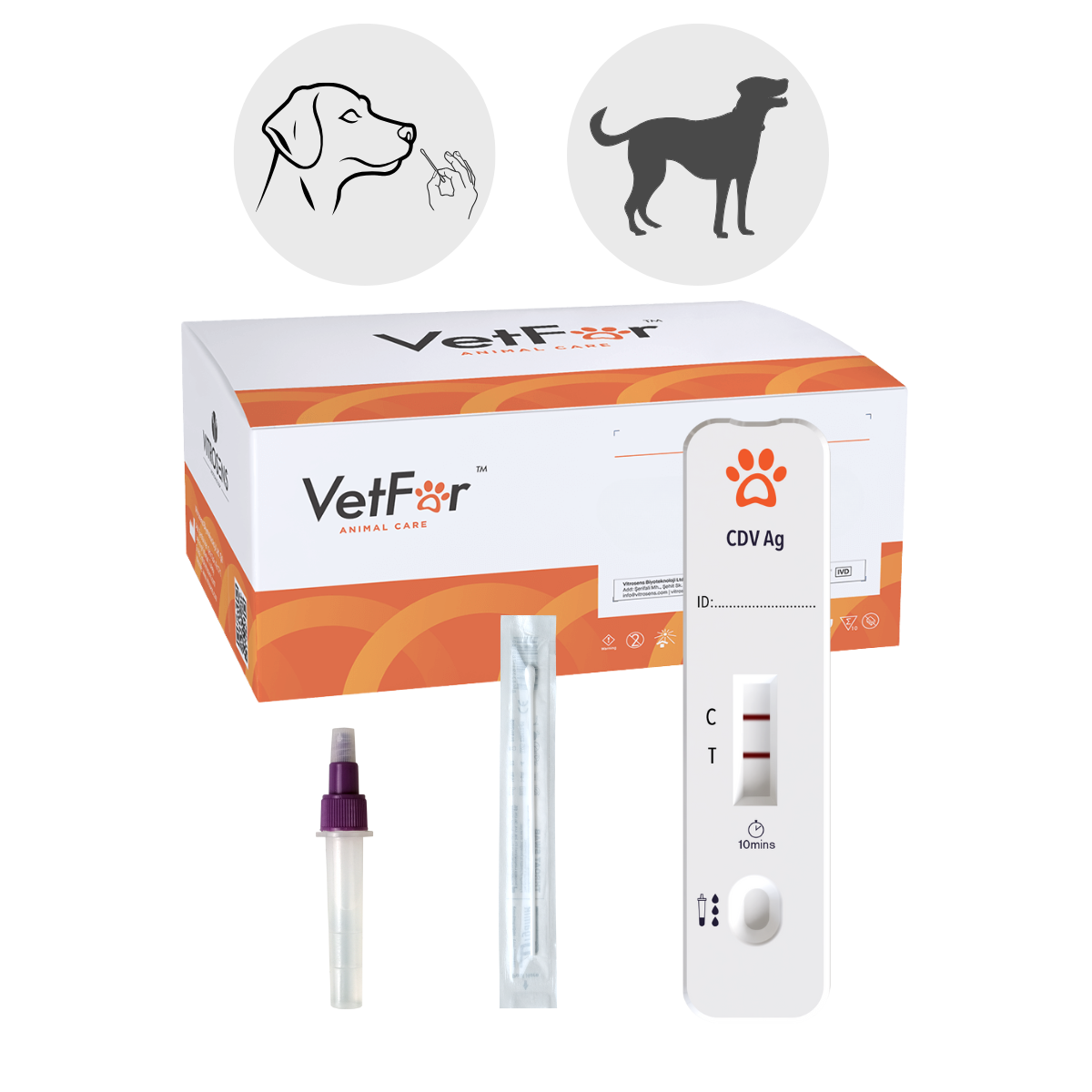Canine distemper virus (CDV) antigen test
The VetFor Canine Distemper Virus (CDV) test is intended for the rapid detection of specific canine distemper virus antigens in conjunctival swabs from dogs.
57,00 €
| Quantity | Price | Discount |
|---|---|---|
| 3-5 | 55,29 € | 3% |
| 6-9 | 53,58 € | 6% |
| 10+ | 51,30 € | 10% |
| Sample type |
Nasal swab ,Saliva swab |
|---|---|
| Target specie |
Canine (Dog) |
| Target |
Canine distemper virus (CDV) |
| Packaging unit |
10 Tests |
| Sensitivity |
98,00% |
| Specificity |
100% |
The VetFor™ CDV Antigen Rapid Test is a veterinary in vitro diagnostic test for the rapid and reliable detection of Canine Distemper Virus (CDV) in nasal and saliva samples from dogs.
The test is based on the lateral sandwich immunoassay principle and provides clear results in a short time. The ready-to-use kit contains all the necessary components for performance and is intended for use by veterinary professionals.
Product details
-
Test type: Lateral sandwich immunoassay
-
Target pathogen: Canine distemper virus (CDV / distemper virus)
-
Sample material: Nose or saliva samples from dogs
-
Result time: rapid test with direct evaluation after 10 minutes
-
Detection limit: 5 × 10³ TCID₅₀ / mL
- Storage conditions: 2 – 30 °C
-
No cross-reactions with CPV, CCV, ICH or PI2
Performance data
-
Sensitivity: 98,00 %
-
Specificity: 100%
-
Accuracy: 99,80%
Scope of delivery
-
10 test cassettes (1 test/bag)
-
10 disposable bottles with 1 mL dilution solution each
-
10 sterile disposable sample swabs
-
1 instruction manual
For professional use only!
SHELF LIFE AND STORAGE
- The test kit must be stored at a temperature of 2 °C to 30 °C and a relative humidity of 40 % to 60 %. All components must be brought to room temperature before testing.
- Do not open sealed bags and test kits before immediate use.
- The test is stable until the expiry date. The test kit must not be used after the expiry date. The expiration date is indicated on the label/packaging of the sealed foil pouch.
- Do not expose the test kit to direct sunlight.
NOTES
- For in vitro diagnostic use only.
- For optimum test results, the manufacturer's instructions should be followed exactly.
- The tests should be carried out with protective clothing in compliance with biosafety measures.
- The test kits must be stored in the sealed packaging until use.
- Do not use the test kit if the pouch is damaged or the seal is torn off.
- The components of the test kit must not be reused.
- All components must be brought to room temperature before the test.
- The test kit may only be used until the specified expiry date.
- The components of this test kit were tested as a standard batch.
- Do not interchange or mix components from different test kits.
- The uncovered areas of the membrane in the test cassette must not be touched.
- Inadequate or incorrect sampling as well as improper storage and transportation conditions can falsify the test results.
- All components of the test kit should be disposed of as infectious material.
You must be logged in to post a review.
Background to canine distemper (CDV)
Canine distemper, caused by the canine distemper virus (CDV), is a highly contagious viral disease that affects the respiratory, gastrointestinal and nervous systems of dogs. Young dogs and unvaccinated animals are particularly at risk. Transmission occurs mainly through direct contact with body fluids of infected animals, such as saliva, urine or feces. Symptoms include nasal discharge, coughing, fever, vomiting, diarrhea and neurological disorders such as tremors or seizures.
Current developments
In recent years, more cases of distemper have been detected in wild animals in Germany. Studies show that the virus has been detected in wild carnivores such as foxes and martens, indicating a continued presence of the virus in the wildlife population and a potential risk to domestic dogs.
Prevention
The most effective protective measure against distemper is vaccination. The Standing Veterinary Vaccination Commission (StIKo Vet) recommends basic vaccination of puppies at the age of 8, 12 and 16 weeks, followed by a booster vaccination after 15 months. The vaccination should then be renewed every three years to ensure lasting protection. Dog owners should regularly check the vaccination status of their pets and ensure that all vaccinations are up to date.
In addition to vaccination, it is recommended to keep dogs away from potentially infected wild animals and avoid direct contact. In areas with known distemper outbreaks, dogs should be kept on a lead to prevent uncontrolled encounters with wild animals.
References
-
Standing Vaccination Commission for Veterinary Medicine (StIKo Vet) at the Friedrich-Loeffler-Institut. (2022). Guideline on the vaccination of small animals, 5th edition. Available at: https://www.openagrar.de/servlets/MCRFileNodeServlet/openagrar_derivate_00044276/Impfleitlinie-Kleintiere_2022-01-01_ba.pdf
-
Kretschmar, P., et al. (2023). Case Report: Canine Distemper Virus Infection as a Cause of Central Nervous Signs in a Eurasian Lynx (Lynx lynx). Frontiers in Veterinary Science, 10:1251018. Available at: https://www.frontiersin.org/articles/10.3389/fvets.2023.1251018/full
-
Schmidt, K., et al. (2020). Canine Vaccination in Germany: A Survey of Owner Attitudes and Compliance. PLOS ONE, 15(9): e0238371. Available at: https://journals.plos.org/plosone/article?id=10.1371/journal.pone.0238371
-
World Small Animal Veterinary Association (WSAVA). (2015). Guidelines for the Vaccination of Dogs and Cats. Available at: https://wsava.org/wp-content/uploads/2020/01/WSAVA-Vaccination-Guidelines-2015.pdf






Reviews
Clear filtersThere are no reviews yet.